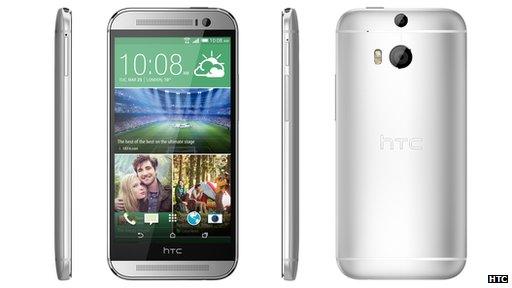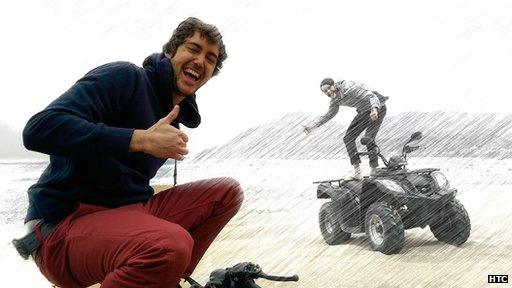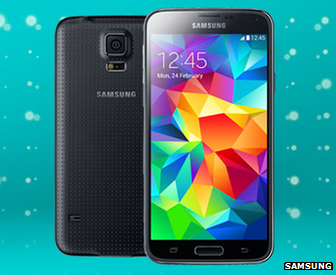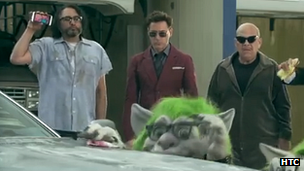HTC One smartphone phone uses depth sensor to refocus
- Published
Rory Cellan-Jones tries out the new HTC One handset
HTC's new flagship Android smartphone features a depth sensor to let owners change what appears in focus in photos after they are taken.
The HTC One (M8) also features a bigger screen and louder speakers than the previous model.
The company said the device should turn around recent weak earnings and help it recover market share.
But experts said Samsung and Apple's bigger marketing budgets would continue to put HTC at a disadvantage.
The Taiwanese company only shipped 6.4 million units of the original HTC One model last year, according to the research firm IDC.
That compares with 43.3 million shipped copies of Samsung's Galaxy S4 and 39.5 million shipped units of Apple's iPhone 5S, which also launched in 2013.
Across its portfolio as a whole, HTC actually sold fewer handsets in 2013 than 2012 despite growth in the wider market.

The new HTC One model features a bigger screen than its predecessor
"This is a make or break device for HTC," said Ben Wood, chief of research at tech consultancy CCS Insight.
"Although last year's HTC One was widely considered the best smartphone of 2013, the company failed to capitalise on this."
Photo effects
One of the new handset's distinguishing features is a sensor on its back used to record distance.
The information is used by an app to allow the owner to mimic the effect of changing focus after a photo is taken, keeping selected objects sharp but blurring others.
It also allows users to add stylised effects to a photo's background while keeping its main subject unaltered.

The depth sensor allows owners to create stylised effected that pick out people or objects
Another innovation is the ability to activate the phone without having to press its on-button. Swiping the screen in different ways takes the user to either what they were last doing, the home screen or a feed of news stories and social media updates.
The company also boasts that battery life is 40% better than before even though it has a bigger, 5in (12.7cm) screen.
However, it lacks a fingerprint scanner despite the firm's inclusion of the security feature on the One Max handset.
Production problems
Despite winning several awards, sales of the original HTC One underperformed.
The firm said that part of the problem was production delays caused by its use of a unibody metal case and a new type of camera.
"We just didn't educate our vendors to do the mass-production well," Cher Wang, the firm's co-founder, told the BBC.
HTC's chief financial officer added that this caused a consumer backlash rather than the positive word-of-mouth effect hoped for.
"The first wave of people is actually quite important - they tend to be most vocal," said Chia-Lin Chang.
"They were waiting and couldn't get it and had to vent, and that's unfortunate.
"But I'm glad to say this year that will not happen because you will see availability right away."

The HTC One (M8) will compete with Samsung's forthcoming Galaxy S5
He said several stores in the UK and US had already been provided with stock and the phone should become available across most of the globe within two-and-a-half weeks.
Ambitious targets
HTC is also changing tack with its marketing campaign.
The firm signed Hollywood actor Robert Downey Jr to a two-year deal in 2013, reportedly for $12m, external.
The initial ads, in which the star suggested the firm's initials could stand for "hipster troll carwash" or "Hungarian tuba concert", faced criticism for focusing too much, external on HTC's brand rather than, external its products.
"This year we [will be] more direct, so the customer will understand our phone much better," said Cher Wang.
Mr Wood said that HTC still had "a mountain to climb", but appeared to have learned several lessons.
"Rather than a two-month lag from launch to shipment, the new HTC One is available immediately," he said.
"This means it hits the shops ahead of new devices from arch-rivals Samsung and Sony.

HTC's initial adverts featuring Robert Downey Jr focused on the firm's brand
"And although HTC can't get close to Samsung's colossal marketing budget, its marketing campaign is significantly more focused than last year's launch."
Mr Chang said HTC hoped to grow its market share to over 5% by the end of 2014 and 10% within three years.
But IDC suggested the targets could prove difficult.
"HTC is being squeezed at the high-end by Apple and Samsung and a market that isn't growing, and in the expanding mid-to-low end by Chinese vendors such as Huawei," said analyst Francisco Jeronimo.
"Without large financial resources it will find it hard to promote its portfolio. But the one thing it has in its favour is very good hardware and industrial design."
- Published25 March 2014
- Published25 March 2014
- Published24 February 2014
- Published6 January 2014
- Published5 January 2014
- Published14 October 2013